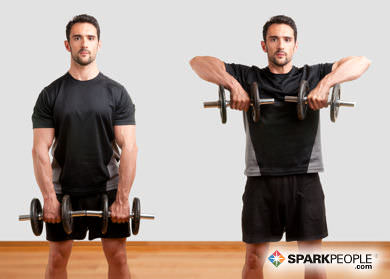5 Popular Gym Exercises that are Controversial
Most people believe that all exercises are good, safe and effective. After all it’s exercise and that has to count for something, doesn’t it?
The truth is that some popular gym exercises aren’t safe at all (especially for people who have muscle, joint, and health problems). Certain exercises require a bit more know-how than the average person possesses. And other exercises are downright wastes of your time.
However, before we start, we want you to know that every exercise on this list isn’t always unsafe or ineffective. What you should do (or not) depends on your goals, fitness level, health history, workout schedule, and other personal issues.
5 Popular Gym Exercises You Should Avoid
Behind the Head Lat Pull Down

In the old days, people were actually taught to pull the bar behind their heads when doing a lat pull-down exercise–and many people still do that today. Bad idea.
The problem? Pulling the bar behind the neck puts far too much stress on the shoulder joint.
The Alternative: You can still work your lats without the risk of behind-the-head pull-downs by pulling the bar down in front of you. Sit with your spine straight, abs pulled in, and then lean your torso back slightly, keeping your spine straight. Pull the bar down towards your chest, but not below your collar bone.

Hovering Leg Lifts

Lie on your back and lift your straight legs right off the ground to hover just a few inches from the floor in order to work your abs.
The problem? Sure this engages your abs, but lifting your extended legs straight off the ground puts an incredible amount of stress on the lower back and can lead to injury.
The Alternatives: Work your abs without straining your lower back by starting with your legs up in the air (not lifting them from the ground) in line with the hips. Then lower your straight legs down to about a 45-degree angle—or only as far as you can lower the legs without feeling any strain in the back and without changing the position of your back.
Seated Knee Extensions

This is a very popular exercise for targeting the muscles on the front of your thighs (quadriceps).
The Problem? This exercise poses risks to the knees when the weight is heavy and when the knees are fully extended. Lifting heavy weights in this position (with all the resistance focused at your ankles) is not what the knee was designed to do. If you have any kind of knee problem, or use too much resistance during this exercise, you can easily run into big trouble.
The Alternatives: Simple squats and lunges with or without added weight, will work your thigh muscles naturally, safely and effectively.

Inner and Outer Thigh Machine Exercises

These machines are pretty popular in most gyms. Both involve sitting with your knees bent in front of you. The adduction machine is designed to target the muscles of the inner thighs, and the abduction machine helps target the outer thigh muscles.
The Problem? Using your inner and outer thighs to lift weight while in a seated position can risk straining these small muscles and aggravating lower back and hip problems. In addition, your inner and outer thigh muscles are designed to support movement, not to be prime movers.
The Alternatives: The best way to target these muscles safely is with body weight exercises. Such as abduction exercises, Pilates exercises, or similar movements that use resistance bands or the cable cross machines. Always start with a weight you know you can handle, and add resistance gradually.

Upright Rows

In this exercise, you stand holding a barbell or weight in the center, with hands close together, and bring your hands up under your chin.
The Problem? Upright rows are controversial because they cause the upper arm bone to bang up against the AC (acromion process) joint which can lead to arthritis.
The Alternatives: The purpose of this exercise is to work the shoulders (deltoids) and upper traps. So instead of standing to perform an upright row, try bent-over rows, bending forward 90 degrees at the hip.
